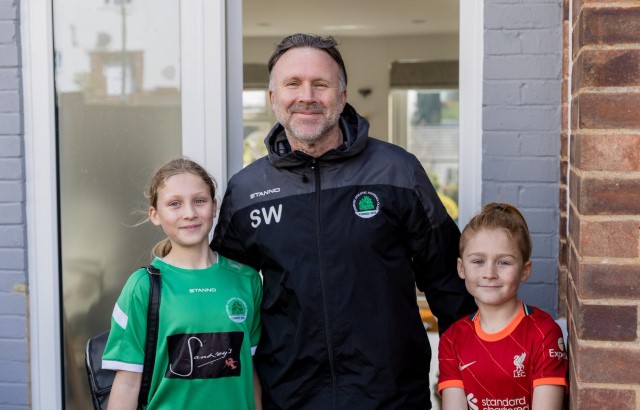

Stuart Waters, from Kent, was driving his two children home from football training when he unexpectedly suffered a cardiac arrest behind the wheel.

In March 2022, Stuart Waters had a normal, busy evening ahead of him. “I was working all day, came home to spend some time with the family. Then we rushed off to football training where I coach my daughter’s team.” Following the session, Stuart drove his two children home. However, as he pulled into their driveway, he suddenly collapsed.
“It was lucky my kids were with me, but unlucky that they witnessed the situation,” Stuart reflects. “My little boy stayed with me – he undid my seat belt and tried to shake me. My daughter went and got my wife, who alerted the neighbours.” Fortunately, Stuart’s neighbours were trained in CPR and one of them had recently taken a refresher course. They got Stuart out of the car and began CPR until the emergency services arrived. “If it wasn’t for them, I don’t think I’d be here,” says Stuart.
Stuart’s memory of that night is still patchy, but he remembers waking up in hospital the next morning feeling confused and angry. “I woke up with pipes and wires everywhere. You think – why has this happened to me?” After a series of tests and MRI scans, Stuart was told that his cardiac arrest was likely triggered by extensive damage to his heart, and he would need triple bypass surgery, possibly a new aortic valve, and later an ICD fitted. However, during the operation surgeons realised the damage to his heart was greater than what they’d initially thought. “My valve had ruptured, so I had a mechanical one fitted. I had to have a new aortic root as well, and five bypasses in the end. The six and a half hour operation turned into thirteen hours,” explains Stuart.
The day after his surgery, Stuart woke up feeling surprisingly well. “I felt better than I thought I was going to, but I was shocked when they said I was going to get up and start walking. But I did it!” From there, Stuart’s recovery journey had ups and downs. Unfortunately, he caught pneumonia and Covid, which slowed the healing process down, but eventually he was allowed home. “Going home was a shock – a nice shock, but also a scary shock. I was used to having nurses there at the push of a button – if I was uncomfortable or needed tablets. But it was lovely to be with the family. They were so supportive.”
Six weeks after he returned home, Stuart started cardiac rehabilitation which taught him how far he could push his body and when to slow things down. Now, Stuart takes every day as it comes – “I enjoy life because I know I’ve been given a second chance. I make every moment count.”
Recovery after cardiac surgery
The process of recovering after heart surgery can be extremely taxing, both physically and mentally. Upon waking up, you may feel confused, achy, and there will likely be soreness and bruising around your sternum. You may have a metallic taste in your mouth and have various tubes and wires attached to you, which help in monitoring your heart rate, blood pressure, and oxygen levels. The medical team will watch your vital signs closely and provide the support and medication you need to manage any pain. Regina Giblin, BHF Senior Cardiac Nurse, says, “Once you’re fully awake, one or two friends or family will be able to come to your bedside. It’ll be very emotional for them and for yourself, but the operation is done, and recovery starts now.”
They typical amount of time spent in hospital after heart surgery is between five and seven days. This may seem short, but a lot of recovery can happen in this time, and you may be surprised at how quickly you can begin walking and showering. Gradually, energy levels will start to improve, and once you return home, short daily walks are encouraged – but it is crucial to listen to your body and allow ample time for rest.
Once you continue your recovery at home, it’s important to attend follow-up appointments to track progress, monitor potential complications, and make any required adjustments to your treatment plan. Emotionally, it’s normal to feel up and down after surgery. “Please speak to your family and friends about how you’re feeling. They’re also going through this as well, so be patient with them. If you find that you’re feeling very anxious or depressed, please speak to your GP,” advises Regina.
To support you in this continued physical and mental recovery, you can start a cardiac rehabilitation programme. This is an evidence-based intervention that is tailored to your needs and helps identify where changes can be made to improve your cardiovascular health. This can be done in-person at a hospital or leisure centre, or you can complete it from home. “I do recommend the programme,” says Regina, “it really does help people recover after heart surgery.”
Do you want to hear more from Stuart Waters and Regina Giblin?
Watch our Live & Ticking event here


